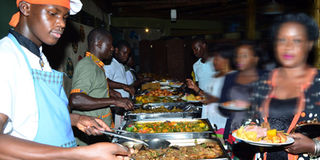Make money by selling cooked food this season

Investing in the catering business, especially at this time of the year, can be a good idea. PHOTO BY MICHAEL KAKUMIRIZI
What you need to know:
Usually this time of the year people spend more on food.
Tap into this, Dorothy Nakaweesi writes.
While there is no surefire recipe for a successful home catering service business, culinary skills and determination can give one the necessary advantage. Catering as a business can be done at home full or part-time.
You can also do it as a couple. Preparing a meal as a couple creates a big bond. But if this is done as business it will not only strengthen your relationship but make you grow rich together.
With the festive season around the corner, usually with long holidays, you too can start this kind of business.
Ms Lelia Bangirana and her husband started a catering business after she lost her job in one of the corporate organisations in Kampala. She did not look for another office job but decided to turn her catering passion into business.
What started as passion 12 years ago, Albar Catering Services, has now transformed the Bangiranas into millionaires.
“I would do the cooking and my husband would help in the deliveries. Our business which started with little savings of about Shs1 million now boosts of a monthly gross of Shs60 million and annual turnover of Shs720 million,” she shares.
Capital
This business idea involves preparing different kinds of foodstuffs. The food is prepared and served to people at their work places or even homes. The various local dishes usually prepared include: Matooke, groundnuts, beef stew, rice, sweet potatoes, beans, cassava, and peas chicken and greens.
You can start small and grow big. You can manage on your own or with a couple of others. Start-up costs mainly depend on how big you want to start, your requirements for selling food, and what you already own to help you get started. The Bangiranas started with Shs1 million and they were doing this in their family kitchen.
According to Uganda Investment Authority (UIA), this business is premised on production of 130 plates of food per day. This translates into 3,900 plates of food per month, and 46,800 plates per year.
With each plate costing Shs5,000, at the end of the month, this will bring you close to Shs20 million. Hoping you do daily book keeping, you should be able to meet costs and get profits.
Raw food stuffs are procured from the market and processed through various preparations then cooked using either a charcoal stove or firewood. Direct costs include materials, supplies and other costs that go into production of food.
Market
The market for this business consists of people who are not able to prepare food because of their commitments at their work place. The food can be vended in different places such as workplaces, markets, building sites and taxi or bus parks. Also, these days there are so many events which require catering services like wedding parties, introduction ceremonies and other public events.
Advice
Ms Bangirana’s advice to those who want to invest in this business is not to think about the money first but to offer good services. She says: “It should not be about making money alone but serving people good food is enough marketing to grow your business.”
She adds that many catering start-ups succeed by conquering a niche; focusing on a particular food and/or certain kinds of events to keep overhead low and advertising focused.
Mr Daniel Joloba, the chief executive officer Big Finance, a firm that does advisory and consultancy for small and medium enterprises, says: “Before starting this business you need to be aware of the fact that no matter how fantastic your restaurant is, it won’t appeal to everyone, which is why it is necessary to carry out a thorough research before starting the business by writing a business plan.”
He adds that your business plan will help identify what demography should be targeted.




